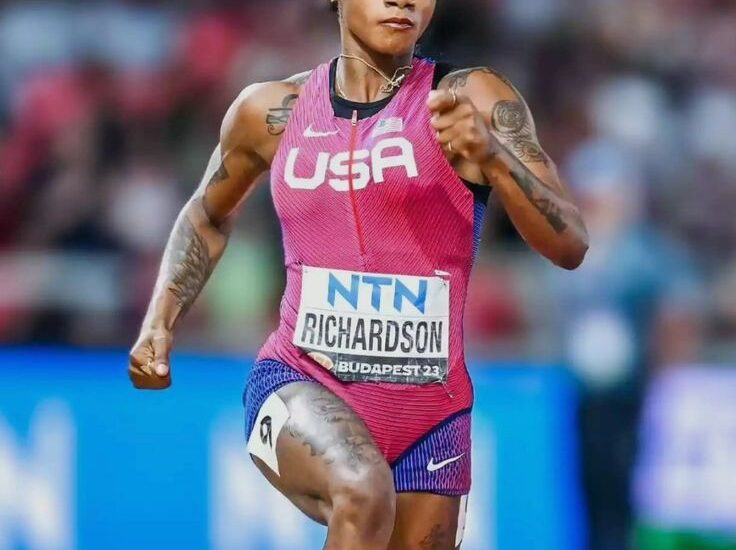
Breaking News; Few minutes ago United States track and field star Sha’Carri Richardson rejected…
Breaking News; Few minutes ago United States track and field star Sha’Carri Richardson rejected…
In a surprising turn of events, United States track and field star Sha’Carri Richardson has made headlines by rejecting a significant sponsorship deal from a leading sports brand. This decision comes in the wake of her recent successes on the track and ongoing discussions about athlete representation, mental health, and brand alignment. The implications of her choice extend beyond just financial considerations; they touch on personal values, the evolving landscape of sports marketing, and the role of athletes as advocates for social issues.
The Context of the Decision
Sha’Carri Richardson, known for her explosive speed and vibrant personality, has quickly risen to fame in the world of athletics. After making a strong comeback following her suspension in 2021, she has consistently showcased her talent, becoming one of the most talked-about athletes in the sport. Her recent performances have solidified her position as a leading contender in the upcoming competitions, including the Olympics.
However, her journey has not been without challenges. Richardson has faced intense scrutiny from the media and public regarding her personal life, performance, and choices. This scrutiny often extends to her branding decisions, making her recent rejection of a sponsorship deal all the more poignant. The decision appears to reflect a conscious choice to prioritize authenticity and alignment with her values over financial gain.
The Importance of Brand Alignment
Richardson’s rejection of the sponsorship highlights a growing trend among athletes, particularly those from marginalized backgrounds, who are increasingly aware of the significance of brand alignment. In recent years, many athletes have begun to prioritize partnerships that resonate with their personal beliefs and values rather than simply accepting the highest bidder.
This shift is particularly relevant for Richardson, who has been vocal about issues such as mental health, identity, and social justice. By rejecting a major sponsorship, she signals to her fans and fellow athletes that she is willing to forgo financial security for the sake of authenticity and integrity. This is a powerful message in an industry where athletes often feel pressured to conform to corporate interests.
The Impact on Athletes and Sponsorships
Richardson’s choice could set a precedent for other athletes, encouraging them to evaluate their sponsorship deals more critically. As athletes gain more agency over their careers, the traditional power dynamics between brands and athletes are evolving. Athletes are increasingly becoming aware of their potential as influencers and advocates, leveraging their platforms to raise awareness for causes they care about.
Furthermore, this decision may prompt brands to reconsider their approach to athlete partnerships. Companies that wish to attract and retain top talent may need to prioritize values-based marketing and demonstrate a genuine commitment to the causes their endorsers champion. This could lead to more authentic and meaningful relationships between athletes and brands, ultimately benefiting both parties.
The Role of Social Media
In today’s digital age, social media plays a crucial role in shaping public perception and influencing brand partnerships. Athletes like Richardson have a direct line to their fans, allowing them to share their thoughts and experiences in real time. This accessibility enables athletes to cultivate a personal brand that aligns with their values and resonates with their audience.
Richardson has effectively used social media to connect with her fans, sharing insights into her life, training, and advocacy work. By rejecting a sponsorship deal, she may also be leveraging this platform to communicate her values more clearly. Fans and followers may be more inclined to support athletes who align with their beliefs, creating a powerful consumer movement around authenticity in sports.
Mental Health and Athlete Advocacy
Richardson’s decision also draws attention to the importance of mental health in athletics. The pressure to perform, combined with public scrutiny, can take a toll on athletes. By prioritizing her values over financial gain, Richardson sets an example for others to prioritize their mental health and well-being.
Mental health advocacy has gained prominence in recent years, with many athletes speaking out about their struggles and the pressures of competition. Richardson’s decision serves as a reminder that athletes are not just competitors; they are individuals with their own challenges and beliefs. By taking a stand, she encourages a broader dialogue about the importance of mental health in sports and the necessity of creating supportive environments for athletes.
Future Implications
As the sports industry continues to evolve, Richardson’s choice will likely have lasting implications.
You may also like
Archives
Categories
- ABA
- Actor
- Actress
- Actress and singer
- Band
- Baseball
- Basketball
- Boxer
- Broadcasting corporation
- CCR
- cricketer
- Cyclists
- Dart
- Drummer
- Fictional character
- Football game
- Formula 1
- Golf
- Guitarist and songwriter
- Guitarists
- Gymnastics
- Hockey
- Ice hockey
- Marathon
- MLB
- Motocross
- MotoGP
- Motorcross
- Musician
- Musician and drummer
- NFL
- NHL
- NRL
- Racer
- Red bull Racing
- Rider
- Rock band
- Rugby league
- Simone Biles
- Singer and songwriter
- Songwriter and musician
- Sport commentator
- Tennis
- Texas longhorns
- Track and field athlete
- Uncategorized
Leave a Reply